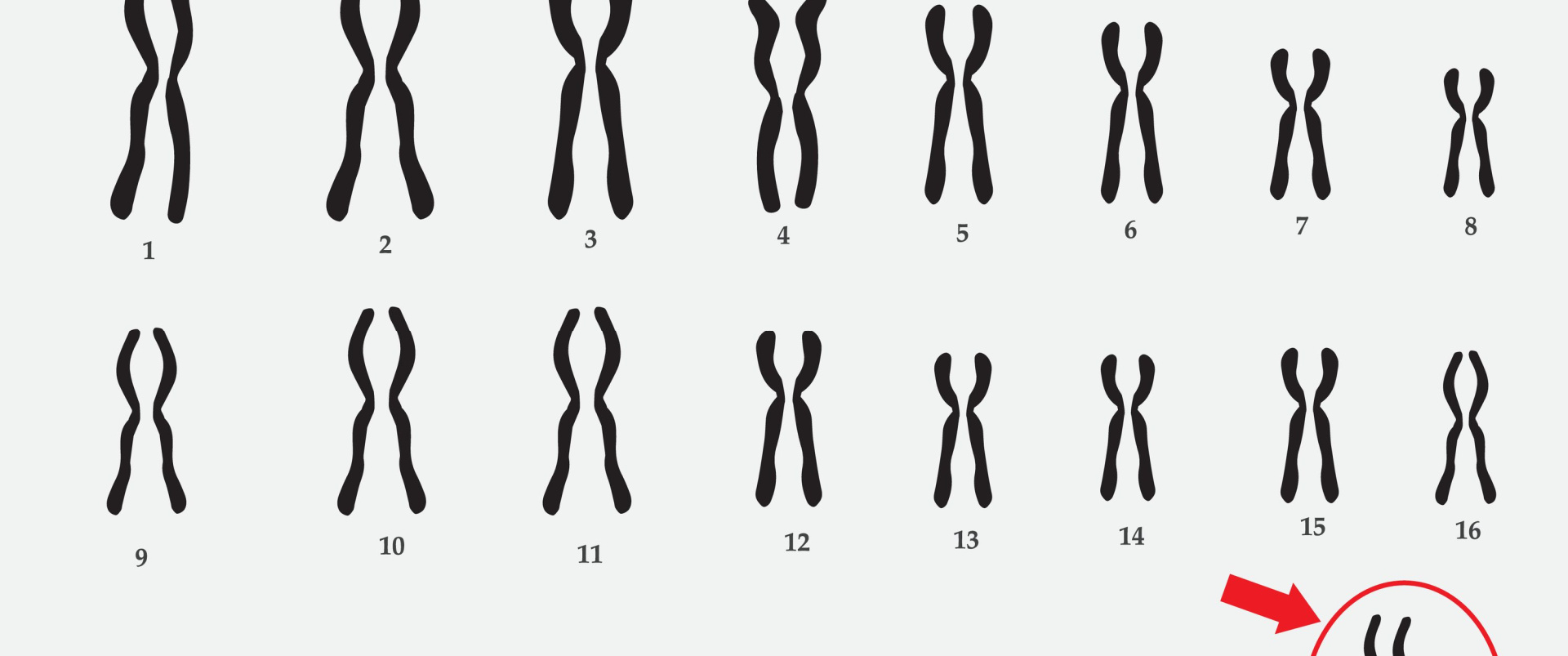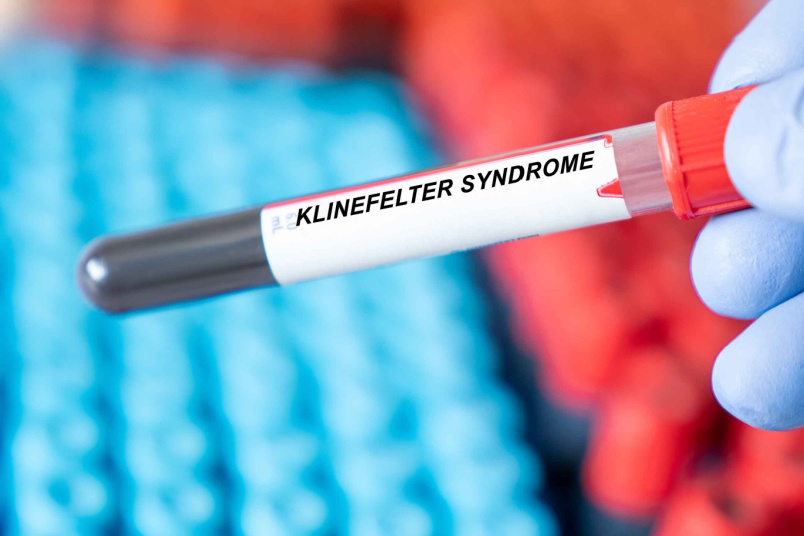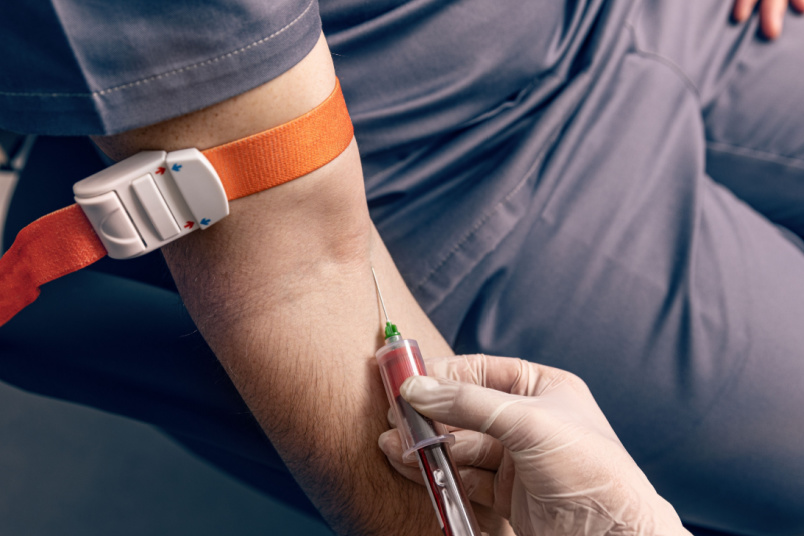Blog >Klinefelter Syndrome and Male Infertility: Causes and Options
Klinefelter Syndrome and Male Infertility: Causes and Options

Klinefelter syndrome is a genetic disorder in males that results in the presence of an additional X chromosome, resulting in a karyotype of 47 XXY, rather than the usual 46 XY. This chromosomal abnormality can result in a variety of physical, developmental, and hormonal alterations. Early diagnosis and treatment can significantly enhance the quality of life of individuals living with this condition.This condition is not inherited from the parents and occurs spontaneously.
Symptoms and causes

Klinefelter syndrome can lead to a range of physical, developmental, and hormonal differences, and it is associated with several symptoms such as:
Infertility: Klinefelter syndrome is a condition in which the majority of men produce little or no sperm, which can lead to infertility.
Gynecomastia: Enlarged breast tissue due to hormonal imbalances is common in individuals with Klinefelter syndrome.
Small Testes: The size of the testes may be smaller than the average, and the development of the testis may be less pronounced in individuals with Klinefelter syndrome.
Low Testosterone Levels: Klinefelter syndrome can lead to a decrease in testosterone levels, which can have an impact on muscle strength, bone mineral density, and overall energy levels.
Tall Stature: Elongated arms and legs are a common characteristic of people with Klinefelter syndrome.
Learning Difficulties: Some men may experience challenges in speech and language development, as well as social and behavioural issues.
Delayed Puberty: Individuals who are affected may experience a delayed onset of puberty, including reduced hair growth on the face and body.
Diagnosis and medical evaluation

Diagnosis of Klinefelter syndrome typically involves:
Clinical Evaluation: A doctor may suspect Klinefelter syndrome based on physical and developmental characteristics commonly associated with the condition, such as being tall, lacking muscle mass, having enlarged breasts, presence of small testes, and developmental delays.
Hormone Testing: Blood tests can be performed to measure hormone levels, such as testosterone and luteinizing hormone (LH). In Klinefelter syndrome, testosterone levels are usually lower than normal, and LH levels are often elevated.
Genetic Testing: The definitive diagnosis is made through a karyotype analysis, which examines a sample of an individual’s blood or other tissue to check for the presence of an extra X chromosome. A karyotype will reveal the 47, XXY chromosomal pattern characteristic of Klinefelter syndrome.
Treatment options

The primary focus of treatment for Klinefelter syndrome is to address the individual’s physical, emotional, and developmental difficulties. The following are some of the available intervention options for Klinefelter syndrome.
Hormone Replacement Therapy (HRT): Low testosterone levels are often treated with testosterone replacement therapy in individuals with Klinefelter syndrome. This can be beneficial in terms of improving secondary sexual characteristics and muscle mass, as well as increasing energy levels.
Psychological Support: Individuals with Klinefelter syndrome may face psychological challenges. These difficulties may include an increased likelihood of developing anxiety and depression, as well as social issues. Counselling and psychological assistance may be beneficial in managing these issues.
Fertility Treatment: The majority of males with Klinefelter Syndrome experience infertility, however, if they wish to father children, assisted reproductive technologies such as In vitro fertilization (IVF), intracytoplasmic sperm injection (ICSI), etc. may be employed. If the semen has no sperms, then the individual may require surgical sperm retrieval techniques ( PESA, TESA, TESE, microTESE).
Monitoring and Management of Associated Conditions: Regular medical examinations are important to monitor and manage potential health issues associated with Klinefelter syndrome, such as diabetes, osteoporosis, and cardiovascular problems.
Surgical Interventions: In certain circumstances, surgery may be recommended to address particular medical conditions, including breast reduction surgery to treat gynaecomastia or the rectification of an undescended testicle.
Treatment options are tailored to address the specific challenges individuals may face, including hormone replacement therapy, educational support, psychological counselling, and the management of associated health conditions. Early intervention and supportive care can enable individuals with the condition to lead a fulfilling life and effectively manage the physical, cognitive, and psychological aspects of this condition.
AndroNeo @NU Hospitals, located in Bangalore, offers ethical treatment options for men dealing with infertility. With a team of experienced doctors specializing in reproductive health, they are well-equipped to handle even the most delicate cases with precision and expertise. If you’re facing fertility challenges, reach out to the specialists at AndroNeo.
Recent Post
- Penile Implant Surgery: A Permanent Solution to Erectile Dysfunction from the expert Andrologist in Bangalore
- Testosterone – why is it so important
- Bengaluru’s Leading Expert in Andrology (Male Fertility and Sexual Health) and Prosthetic Urology – Dr Pramod Krishnappa
- Varicocele – The Hidden Cause of Male Infertility
- No Sperm and Its Link to Genetic Factors: An Exploratory Guide
Related Post
Penile Implant Surgery: A Permanent Solution to Erectile Dysfunction from the expert Andrologist in Bangalore
Penile Implant Surgery: A Permanent Solution to Erectile Dysfunction from the expert Andrologist in Bangalore Living with erectile dysfunction (ED) is not only a physical
Testosterone – why is it so important
Testosterone – why is it so important Testosterone hormone is one of the most important hormones in our body, it is primarily a male hormone
Bengaluru’s Leading Expert in Andrology (Male Fertility and Sexual Health) and Prosthetic Urology – Dr Pramod Krishnappa
Bengaluru’s Leading Expert in Andrology (Male Fertility and Sexual Health) and Prosthetic Urology – Dr Pramod Krishnappa Overview Dr. Pramod Krishnappa is an exceptional Andrology
Varicocele – The Hidden Cause of Male Infertility
Varicocele_ The Hidden Cause of Male Infertility Infertility in men is a problem for millions of couples around the world, and one of the common
No Sperm and Its Link to Genetic Factors: An Exploratory Guide
No Sperm and Its Link to Genetic Factors: An Exploratory Guide Azoospermia, a leading cause of male infertility, occurs when a man’s ejaculate (semen) does
Penile Implant For Erectile Dysfunction: Preparation, During & After Surgery
Penile Implant For Erectile Dysfunction: Preparation, During & After Surgery A penile implant, also called a penile prosthesis, is a treatment method used to treat
